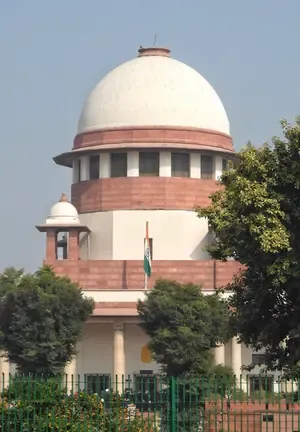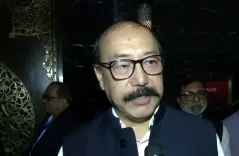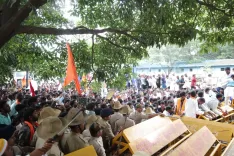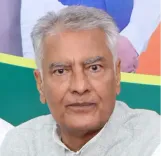RJD MP Manoj Jha Submits Application to Intervene in Supreme Court Regarding Places of Worship Act

New Delhi, December 11 (NationPress) Just one day prior to the pivotal Supreme Court hearing concerning the validity of the Places of Worship Act, RJD MP Manoj Jha filed an intervention application on Wednesday. He articulated that the fundamental aim of the 1991 Act is to safeguard the secular essence of India's democracy by preventing any alteration of a place of worship from its religious identity as it was on the day of Independence.
"The 1991 Act was legislated by Parliament to avert communal tensions and uphold the constitutional principles of equality, fraternity, and secularism.
"In this regard, it fulfilled the legislative duty to promote harmonious coexistence among individuals of various religious affiliations and to protect the Constitution's inclusive spirit," the application stated.
The document further indicated that the Parliament established this law to maintain communal peace and avert conflicts over religious sites that could disrupt public order.
Jha also mentioned, through his writings and parliamentary debates, his opposition to reopening settled matters relating to religious locations, warning that such actions could provoke unrest, and underscored the Act's crucial role in sustaining tranquility.
For any individual seeking justice or remedy against actions taken by any ancient rulers, the law is not an appropriate solution, he added.
The application stressed that the 1991 Act represents a vital legislative framework that corresponds with the goals of the Indian Constitution, as detailed in the Preamble and Articles 14, 15, 25, 26, and 51A, ensuring the protection and maintenance of all places of worship as they were on August 15, 1947.
"The 1991 Act does not contravene any fundamental rights under Part III of the Constitution; it indeed promotes the core principles of our Constitution. It is asserted that the Act underscores the responsibilities of a secular state and India's dedication to the equality of all religions," the application stated.
Moreover, it pointed out that there has been a recent surge in "sectarian politics at the expense of constitutional values," with recent occurrences of exploiting religion, dividing communities, and promoting a divisive agenda leading to increased threats against dissent and diversity.
The Supreme Court has assembled a three-judge Special Bench to review a series of petitions disputing the validity of specific provisions of the Places of Worship (Special Provisions) Act, 1991.
According to the causelist released on the apex court's website, a special Bench led by CJI Sanjiv Khanna, along with Justices Sanjay Kumar and K.V. Vishwanathan, will deliberate on the matter on December 12.
A similar application has been filed by the Managing Committee of Varanasi's Gyanvapi Mosque in the Supreme Court, arguing that declaring the 1991 Act unconstitutional would have severe consequences, potentially undermining the rule of law and communal harmony.
The mosque committee contended that an Article 32 petition aiming to challenge a legislative act must demonstrate the unconstitutionality of its provisions based on constitutional tenets, asserting that calls for retribution against perceived actions of past rulers cannot serve as a foundation for a constitutional challenge.
"The Parliament, in its wisdom, enacted this legislation recognizing the secular values embedded in the Constitution. The applicant respectfully submits that as this Hon'ble Court evaluates the challenge to the 1991 Act, the petition should be dismissed as lacking merit," the application concluded.






